Helen Macdonald on life after H is For Hawk and the joy of living alone with her parrot
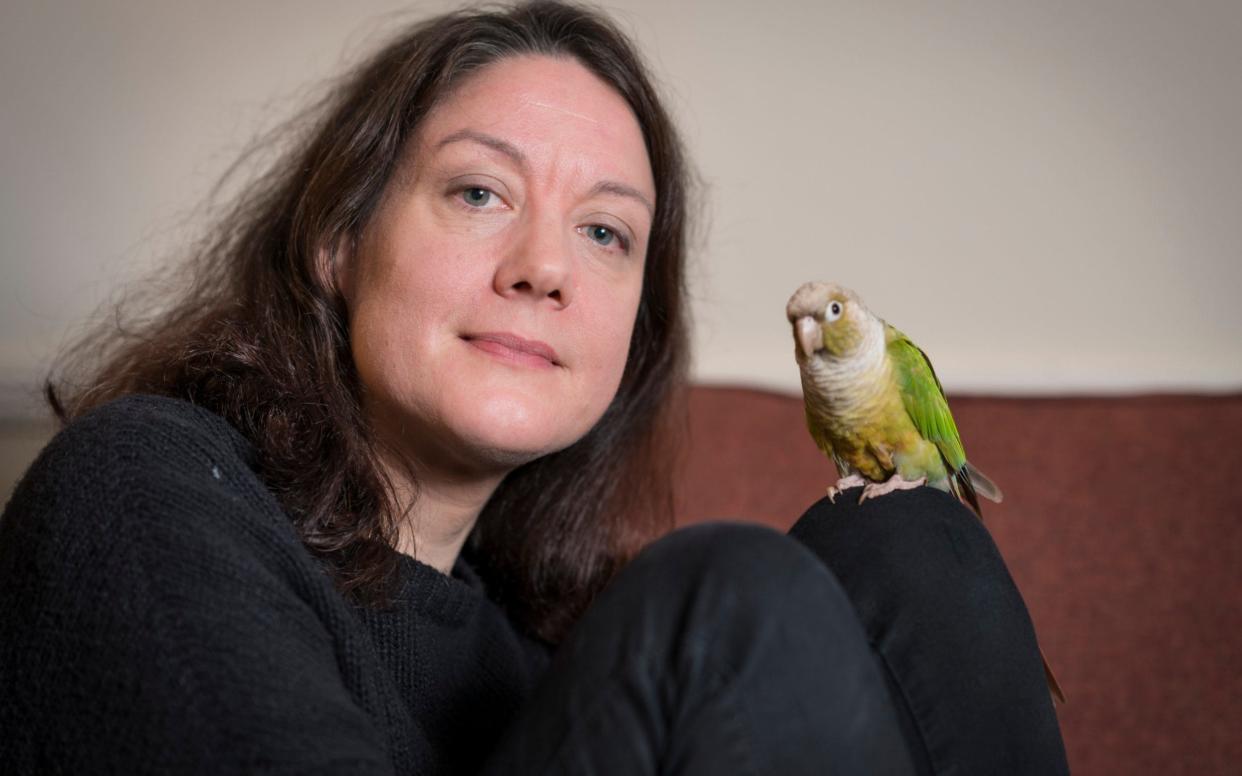
Birdoole, a 14-year-old green-cheeked conure, struts across the kitchen table towards me. “Careful,” says Helen Macdonald, as I dangle a forefinger near the parrot’s beak. “He will draw blood if he’s in a bad mood.”
Readers will, of course, know the author for another avian companion. Indeed, the H in Helen’s name will be forever associated with hawks - specifically Mabel, the goshawk she trained as a way of coming to terms with her father’s sudden death, a decade ago.
Macdonald’s subsequent memoir, H is for Hawk, became an international bestseller following its publication in 2014 – with the tragic postscript that Mabel had succumbed to a fungal disease known as aspergillosis a year earlier.
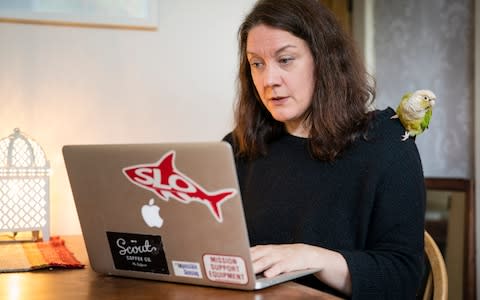
Now, though, there is a different bird in her life. Macdonald and her parrot reside in a stone-built terraced home in a Suffolk village.
“I’m a cliché right?” she says, as Birdoole flutters from her hand and settles on top of the kitchen door, where he gently dozes off. “A single woman in my 40s living with a parrot alone in my house.”
Life has been a whirlwind for the 47-year-old since the staggering success of her debut book, which won numerous awards including Costa book of the year and the Samuel Johnson prize. H is for Hawk has proved particularly successful in the US, where it has sold more than 250,000 copies. The Game of Thrones actor Lena Headey has secured the rights and is currently working on producing and starring in her own adaptation.
“One minute I’m this muddy feral creature running around British hillsides with a goshawk, and then suddenly I’m in LA talking to this extraordinary actor and thinking what has happened to my life?” says Macdonald.
She now travels the world on promotional tours and exotic writing commissions for – among others - the New York Times – and is researching a new book on albatrosses. Later this month, she will star in a BBC Two documentary which sees her train a new goshawk.
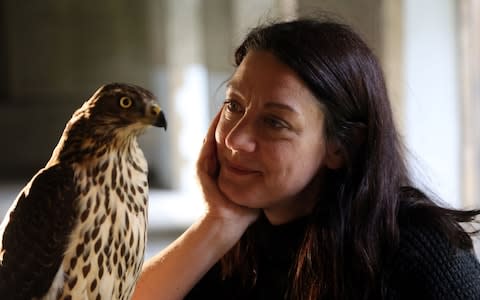
The morning we meet, Macdonald has just returned from New York and is nursing jetlag, as well as a disgruntled parrot, who stays with a nearby friend in her absence and resents the time apart.
The long spells away from home mean she has little time for romantic relationships, but Macdonald rails against the idea that she should somehow feel guilty for her domestic situation: single, childless and contentedly pursuing her creative ambitions.
“There is something really interesting and troubling about the fact women of a certain age, who haven’t got a partner and like animals, somehow feel a little bit shameful,” she says. “I do worry about that – being seen as the crazy cat lady - I mean, I don’t feel like that but I don’t fit into the proper categories. I’m a bit eccentric.
“Often there is an assumption people like the company of animals because they have been let down by somebody. That they’ve failed somehow in life, so animals have become a refuge. I see that as nonsense, but interesting all the same.”
I'm a lot softer these days, a lot less guarded
Helen Macdonald
Macdonald adores spending time with her nieces and godchildren, and passionately teaches them about the natural world. The loss of a connection between children and nature is, she says, “heartbreaking”.
She recalls one springtime walk around Wicken Fen, a nature reserve close to her home, with her then 11-year-old niece, where they spotted cuckoos, barn owls, nightingales and a deer. As they headed home, her niece asked whether all the animals had come from a zoo.
“I had this lurch in my stomach,” she says. “I told her that it was all like this, once. But for her, the countryside is dead. She just couldn’t get her head around the fact that 70 years ago this would have been everywhere. We are in a situation where ‘nature’ might feel to some children like it only happens in special places.”
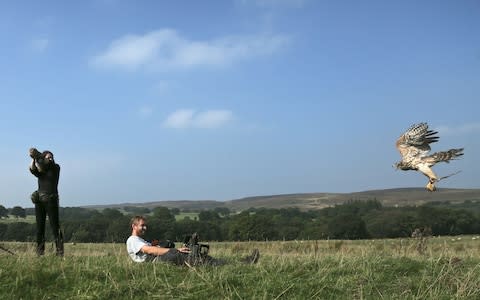
The daughter of two journalists – her father was the youngest staff photographer on the Daily Mirror and her mother worked on local newspapers in Camberley, Surrey – Macdonald’s own childhood was, by contrast, rich in wildlife. On weekends she volunteered at a bird of prey sanctuary and kept her own kestrel by the age of 12.
There was also a crow, called Albert, who she found in a field; a nest of baby bullfinches that she and her mother hand-reared and released; and a badger cub placed in a box in the airing cupboard and which proceeded to clamber out overnight fouling the clean linen. “My parents were very long suffering,” Macdonald admits.
She read English at Cambridge and then worked in Abu Dhabi, where she helped train hunting hawks for Arab sheikhs, before returning to research and teach at her university’s department of history, philosophy and science.
When her father suddenly died from a heart attack, in 2007, her decision to adopt and start training Mabel was, says Macdonald, an attempt to sever all connections; not just from other people, but also herself.
I lost sight of what it meant to be a person
Helen Macdonald
They would spend hours in the wilderness alone together, Mabel catching rabbits and Macdonald quickly rushing in to put them out of their misery (hawks are otherwise content eating their prey alive). Theirs was a dark and visceral companionship.
“I felt orphaned and hated all the feelings inside me,” she says. “I knew I couldn’t train grief – this horrible wild thing that had gripped me - but I knew I could train a hawk. That led to this very weird over-identification with the bird, where I lost sight of what it meant to be a person.”
In the new BBC documentary, filmed over seven months last year, Macdonald trains another goshawk (Lupin) – her first since Mabel’s death – but, this time, in company on a friend’s farm high up in the Pennines. It is a beautiful, quiet film, documenting the incredibly close connections falconers establish with their birds.
During filming, did Macdonald worry she would be transported back to that period of grief?
“I think I’m a lot softer these days. A lot less guarded. I used to really believe I was an introvert. One of the things I’ve realised over the past few years is that is just nonsense.”
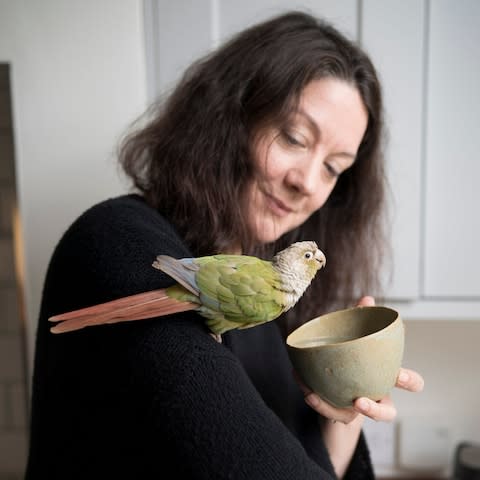
She eventually chose not to keep Lupin, who is now with another trainer. Goshawks are like relationships, she explains, it is best to move on and not look back (although she keeps three of Mabel’s feathers in a jar on her desk).
There are numerous other biological curiosities about the house: the shed skin of a grass snake, which Macdonald found while out walking, a stuffed sparrowhawk and a jar of porcupine spines from which she insists I take one before I leave.
While smoking a cigarette in her front garden, she excitedly points out two fat spiders that have slung their webs between the bushes.
“You can encounter the wild anywhere,” she says. “Any contact with non-human minds is really valuable. Thinking about what the world is like for a spider is good for people - that sense of experiencing landscapes full of life. Losing that really scares me.”
H is for Hawk: A New Chapter is on BBC2 on October 19 at 9pm

